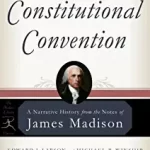Today, I’ve been watching the arrest of Donald Trump. For half of the nation it marks the strength of the system in bringing a criminal and dangerous leader to justice. For the other half, it is a major miscarriage of justice, a victory for a system turned criminal. The latter half cried for protest, but the gathered crowd is milling about in peace. So far, the event has unfolded with as little of the forecasted drama as the debt crisis last week. We are a long way from recovered from the mess Trump and company have made of the nation, but today it looks as though we are still a people committed to the rule of law. Peace is so unexciting compared with war—almost an anticlimax—but we should take note, take heart.
Perhaps if Trump is removed from the scene—and that’s far from happening—we can settle down to look at the mess we’ve made, a mess that had come within a hair of bringing down the system that has supported us for 250 years. If you, like me, have watched the events of the last six years with fear and outrage, these years have brought home our need for order, for shared values—for each other.
had come within a hair of bringing down the system that has supported us for 250 years. If you, like me, have watched the events of the last six years with fear and outrage, these years have brought home our need for order, for shared values—for each other.
We need to reassess what we mean by “freedom” and “individualism.” Those words have never meant freedom from the system or from responsibilities we’ve voluntarily taken upon ourselves. We’ve allowed the wealthy to  treat government as an inconvenient encumbrance, and the population as numbers. As a result, we’ve become reacquainted with unfettered “freedom” and the power of greed. We’ve stripped ourselves of mutual responsibilities to the point where we’ve developed an underclass of despair which we now demand government take care of—forgetting that the government is us.
treat government as an inconvenient encumbrance, and the population as numbers. As a result, we’ve become reacquainted with unfettered “freedom” and the power of greed. We’ve stripped ourselves of mutual responsibilities to the point where we’ve developed an underclass of despair which we now demand government take care of—forgetting that the government is us.
We’ve turned loose technological power without concern for its effect. Our uncritical belief in technology has blinded us to all human consequences. Lessons we learned with the atom bomb have been forgotten. Now we’re confronted with the power of the Internet to spread hatred and destruction and with the possibility that artificial intelligence will soon be able to take control of our being.
 We’ve taken the stability of our system for granted. We’ve neglected teaching both the underlying principles of our system or its dependence on the behavior of the citizenry for its survival. Democracy is indeed exceptional in that it’s based on ideas, not brute power. But we’ve allowed half of our population, or more, to believe those ideas are the possession of one specific group of humans—those who are white and Protestant. Now we are dealing with a rise in bigotry that can destroy the central principle of our laws and culture: treat others as you would be treated.
We’ve taken the stability of our system for granted. We’ve neglected teaching both the underlying principles of our system or its dependence on the behavior of the citizenry for its survival. Democracy is indeed exceptional in that it’s based on ideas, not brute power. But we’ve allowed half of our population, or more, to believe those ideas are the possession of one specific group of humans—those who are white and Protestant. Now we are dealing with a rise in bigotry that can destroy the central principle of our laws and culture: treat others as you would be treated.
We have, in short, been reintroduced to the human condition. We have separated Church and State and thereby freed our beliefs from divine authority, but it is our founders’ beliefs in the “Golden Rule” (above) that shaped the Constitution and laws of the nation. Central to these, and to all of the major religions, is the principle that civility depends on mutual respect, and that grounding principle does not require a ruling deity. Religions also embody the wisdom of the ages on the human condition, and so are worth a look. Christianity’s seven Capital Sins list human passions that are not wrong in themselves, but are vulnerable to excess: Anger, Envy, Pride, Greed, Lust, Gluttony and Sloth. Each of these has a contrary virtue, and now that we’ve had a good dose of the destruction wrought by this excess, we can regain some balance.



Comments are closed.